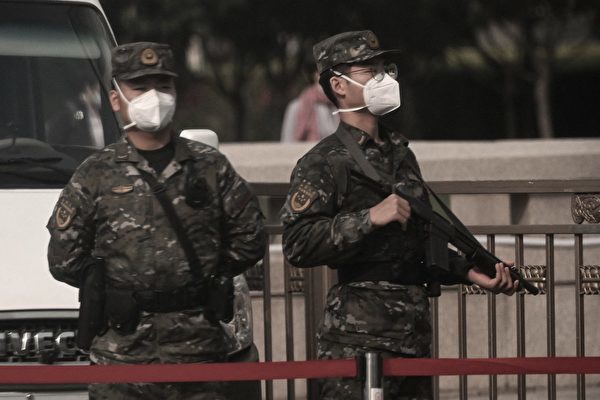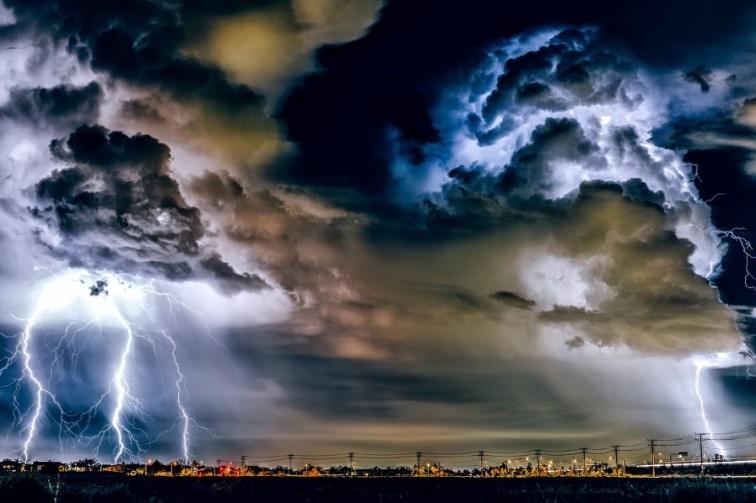Caption: On October 13, 2022, ahead of the 20th National Congress of the Chinese Communist Party, security personnel were stationed along the road leading to Tiananmen Square. (NOEL CELIS/AFP via Getty Images)
[People News] Will the Chinese Communist Party (CCP) attempt military unification of Taiwan in 2025? Many political analysts believe it’s unlikely. However, some suggest that Xi Jinping’s CCP is preparing to “militarize” Zhongnanhai instead.
Maotai Scandal Sparks Potential Infighting Among Party Elites
Recently, Australian-based scholar Yuan Hongbing, who is well-versed in the workings of the CCP, revealed that the regime is planning a large-scale purge of officials in both government and state-owned enterprises in 2025, with retroactive investigations targeting retired officials. This could implicate the families of some retired Politburo Standing Committee members. Additionally, there are rumors of plans to purge 600 military officers, particularly those linked to the Miao Hua case. With many within the Party, including members of the “Red Second Generation,” reportedly seeking to depose Xi Jinping, the stage appears set for internal strife. If this unfolds, 2025 could witness a “bloody showdown” within Zhongnanhai.
On January 2, the CCP officially announced that Ding Xiongjun, former chairman of Kweichow Moutai, was under investigation for “serious violations of discipline and law.”
Ding, 50, is a CCP Guizhou Provincial Party Committee member and a deputy to the National People’s Congress. As the chairman of Kweichow Moutai—a state-owned enterprise synonymous with the CCP’s “national banquet liquor” and a prized diplomatic gift—Ding was deeply connected to high-level Party officials. His fall suggests an impending power struggle among the elite over control of Moutai and its vast resources.
In 2024, 58 officials at or above the vice-provincial level were investigated, the highest number since Xi Jinping’s anti-corruption campaign began. Of these, 37 were found guilty of embezzling over a billion yuan.
Many of these cases involved political disloyalty disguised as economic crimes.
2025: Rising Use of ‘Retention in Custody’ and Retroactive Investigations
According to a report by CNN in late December, an investigation found that since 2018, the Chinese Communist Party (CCP) has constructed or expanded over 200 specialized detention centers across the country. These facilities, known as "liuzhi" (retention), are key tools of the National Supervisory Commission, established in 2018. Unlike the previous "shuanggui" system, the liuzhi system has been granted legal status, providing supervisory bodies with broader investigative powers. The targets of investigation are no longer limited to Party officials but have been extended to military officers and all personnel exercising public authority.
The report noted that the newly constructed and expanded liuzhi centers are more standardized in size and facilities. The number of such facilities increased significantly in 2023 and 2024, with further expansion underway, indicating that the use of detention may increase in 2025. This "self-revolution" spares no room for the so-called "double-faced individuals"—those who appear loyal but undermine the Party from within. These "traitors," who "eat from the central trough while digging the central grave," are deemed relentless in their schemes to harm the Party. The leadership seems willing to exhaust all measures—civil or military, through bribery or coercion, metaphorically ransacking their ancestors' graves if necessary—to bring them into ideological alignment with the Party, to ensure loyalty, and to achieve absolute unity.
In consolidating Zhongnanhai (symbolizing the CCP leadership), 2025 could witness a political storm of "hurricane-force magnitude." Insiders have revealed that this year, the regime will focus on three main actions in its internal purges: Targeting the military. Cleaning up officials in Party, government, and state-owned enterprises. Retrospectively investigating retired personnel.
According to Yuan Hongbing, the retroactive investigations may involve seizing illicitly acquired assets from some retired Politburo families.
Yuan notes that except for Xi’s loyalists like Cai Qi, many within the Party—including the “Red Second Generation” and other factions—are eager for Xi’s removal.
Many find it perplexing: Xi is not merely a “class monitor” among his Politburo peers but akin to their “head teacher.” How could the “students” oust the “head teacher”?
Yuan argues that they are waiting for an opportunity, as the likelihood of “gray rhinos” and “black swans” disrupting the system is high this year. Signs are already evident in deepening economic and political crises, bureaucratic inertia, rising public dissent, deteriorating international relations, and escalating tariff wars with Western countries.
Xi appears aware of these challenges. During a political work conference late last year, he repeatedly warned, “Whoever dares to defy Party discipline will be disciplined by the Party.”
It's not just internal Party issues; the most critical problem is that the guns, which the CCP has always emphasized must point at external threats, are now being directed at the Party itself. This is truly life-threatening!
To "militarily unify" Zhongnanhai, does the gun barrel agree?
At the end of last year, reports on the Central Party life meeting indicated that Zhang Youxia’s ranking was surpassed by another vice chairman, He Weidong. Du Wen, a former deputy director of the Legal Advisory Office of the Inner Mongolia Autonomous Region Legal Affairs Office, analyzed that Zhang Youxia has long been an important ally of Xi Jinping. As a senior vice chairman of the Central Military Commission, the change in ranking could signify a deeper integration of the military leadership by Xi Jinping. This signals an adjustment in the power structure at the top of the Chinese Communist Party (CCP) and marks a new round of personnel reshuffling aimed at strengthening Xi's control over the military.
Recently, there have been significant personnel changes involving senior military officers within the CCP. These adjustments demonstrate Xi Jinping’s efforts to purge potential dissenters and reinforce loyalty to his leadership. However, the frequent personnel changes have also triggered instability within the military, intensifying factional struggles.
Some analysts suggest that Xi Jinping may believe in the prophecy from the Tui Bei Tu (a classical Chinese divination text), which refers to the "bow-bearer," possibly identifying Zhang Youxia as such. Alternatively, Xi might have been influenced by overseas media analyses suggesting that "Zhang Youxia has grown too powerful, threatening Xi’s control of the military." In response, Xi may be acting preemptively by elevating He Weidong over Zhang Youxia. However, as the prophecy goes, "a golden sword is hidden inside the eastern gate"—and He Weidong’s name contains the character "Dong" (east), which could metaphorically represent the hidden "golden sword."
Recently, reports have surfaced that former Army Commander Han Weiguo is in trouble. Independent commentator Cai Shenkun stated that Han Weiguo was notably absent from the New Year Tea Party held in Beijing, further confirming rumors of his downfall. This is similar to the absence of other high-ranking officials during the inauguration ceremony of the new Army Political Commissar Chen Hui, including Army Commander Li Qiaoming, former Army Political Commissar Qin Shubao, Navy Political Commissar Yuan Huazhi, and Armed Police Commander Wang Chunning. The New Year Tea Party is typically the best occasion for retired generals to appear, and Han Weiguo’s absence likely indicates that, like the others, he is either under investigation or has already been detained.
Han Weiguo, like Miao Hua, has been considered one of Xi Jinping’s loyalists within the military. If the reports of his detention are true, it would suggest that Xi is losing control over the military, and internal strife within the armed forces is escalating.
Notably, on December 25, former Deputy Army Commander Lieutenant General You Haitao and Southern Theater Navy Commander Lieutenant General Li Pengcheng were stripped of their roles as National People's Congress representatives.
Disloyalty to Xi within the military appears to be growing increasingly severe. If Xi intends to "militarily unify" Zhongnanhai (a metaphorical reference to consolidating control over the CCP leadership), he may need to first ask whether the military—the "barrel of the gun"—agrees. After all, is it still the Party that commands the gun, or has the gun begun to command the Party?











News magazine bootstrap themes!
I like this themes, fast loading and look profesional
Thank you Carlos!
You're welcome!
Please support me with give positive rating!
Yes Sure!